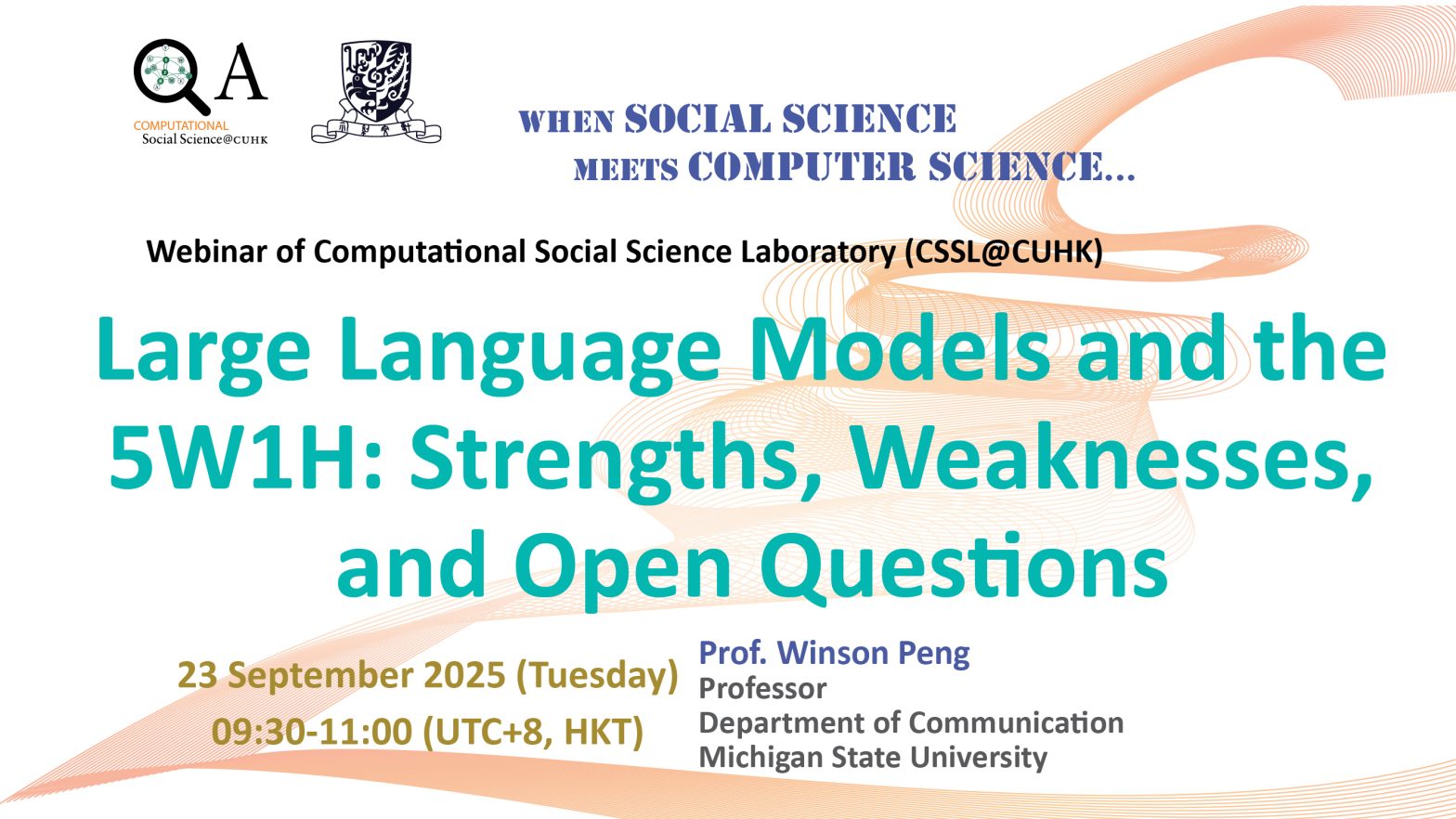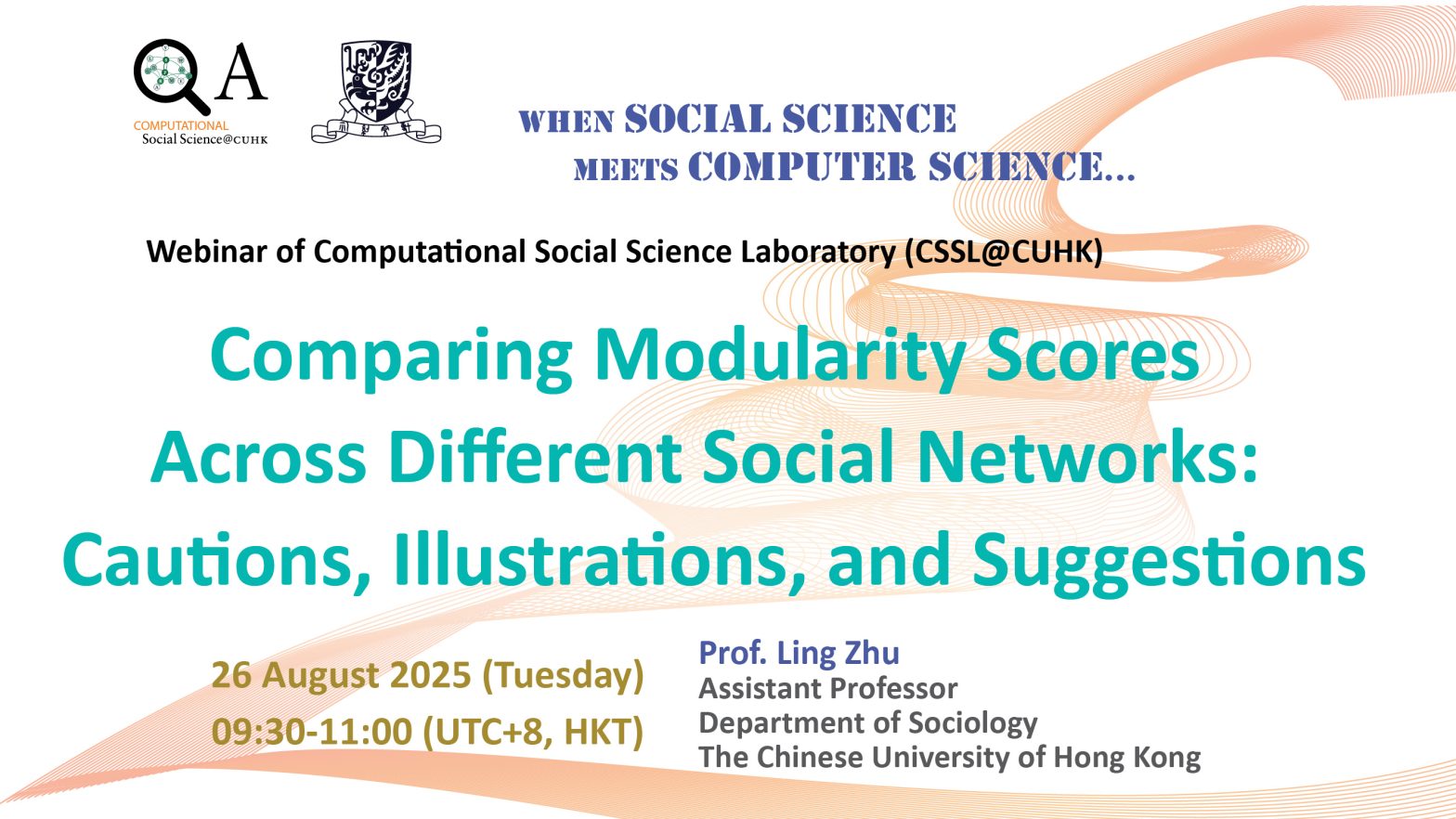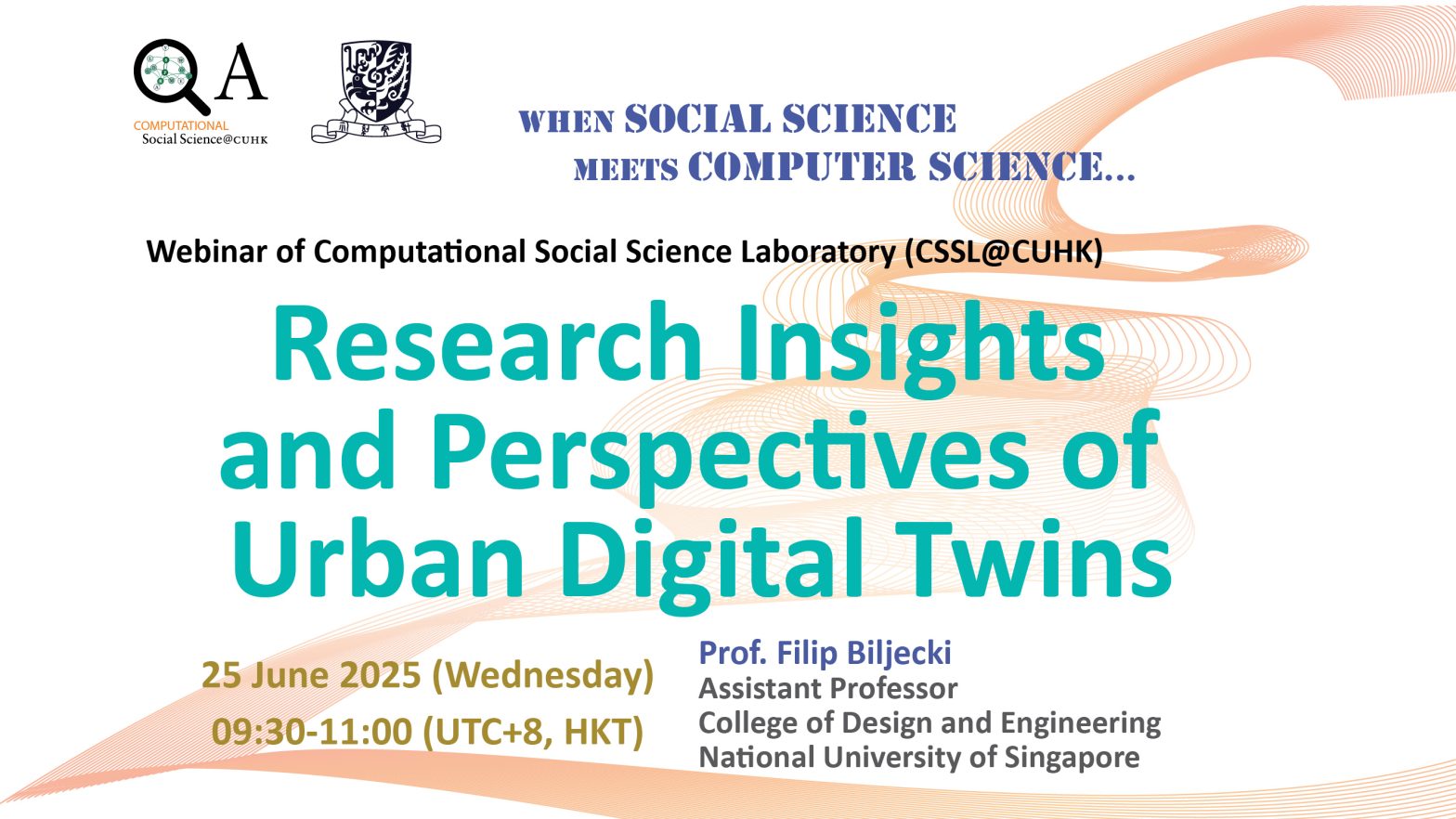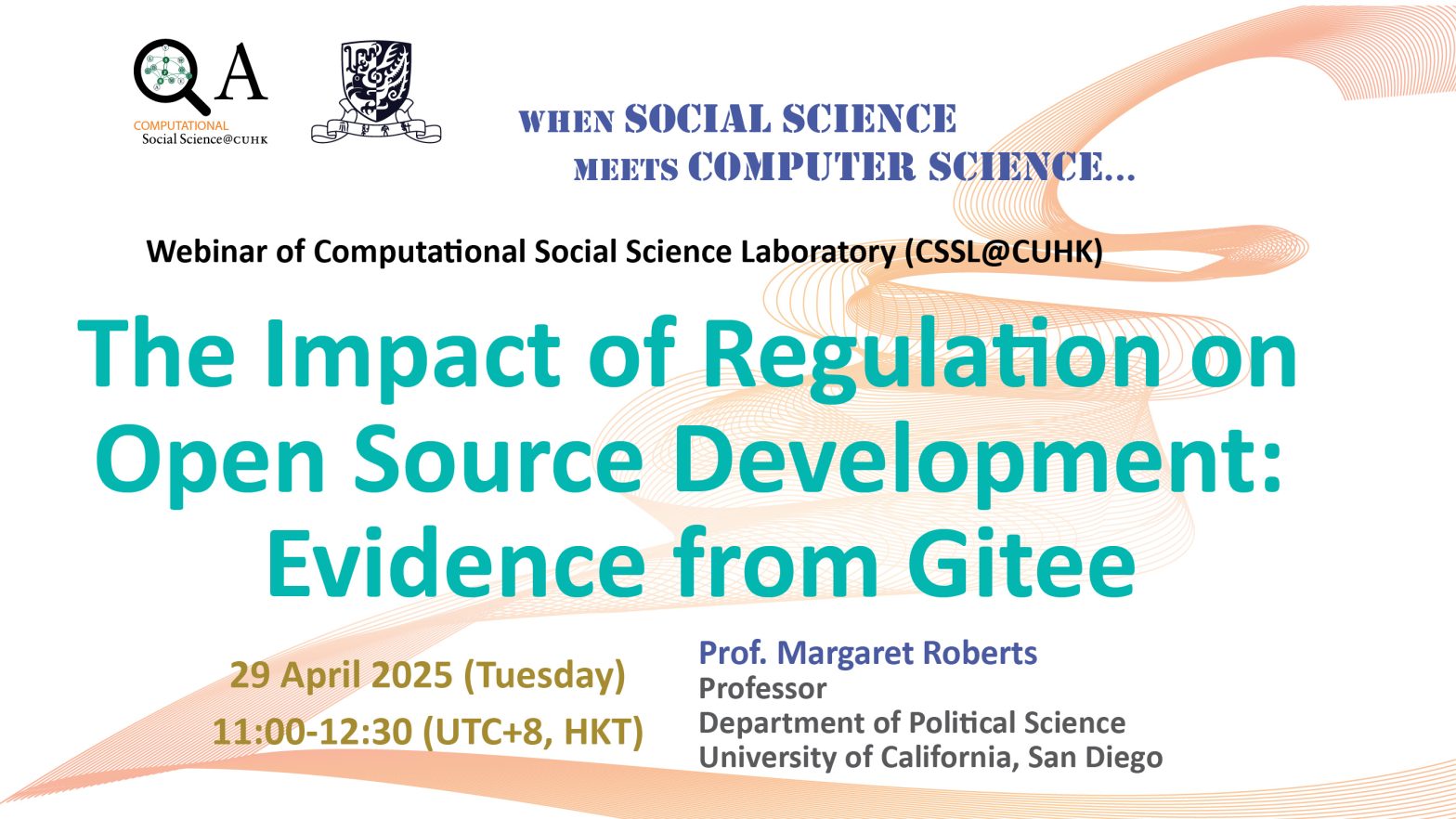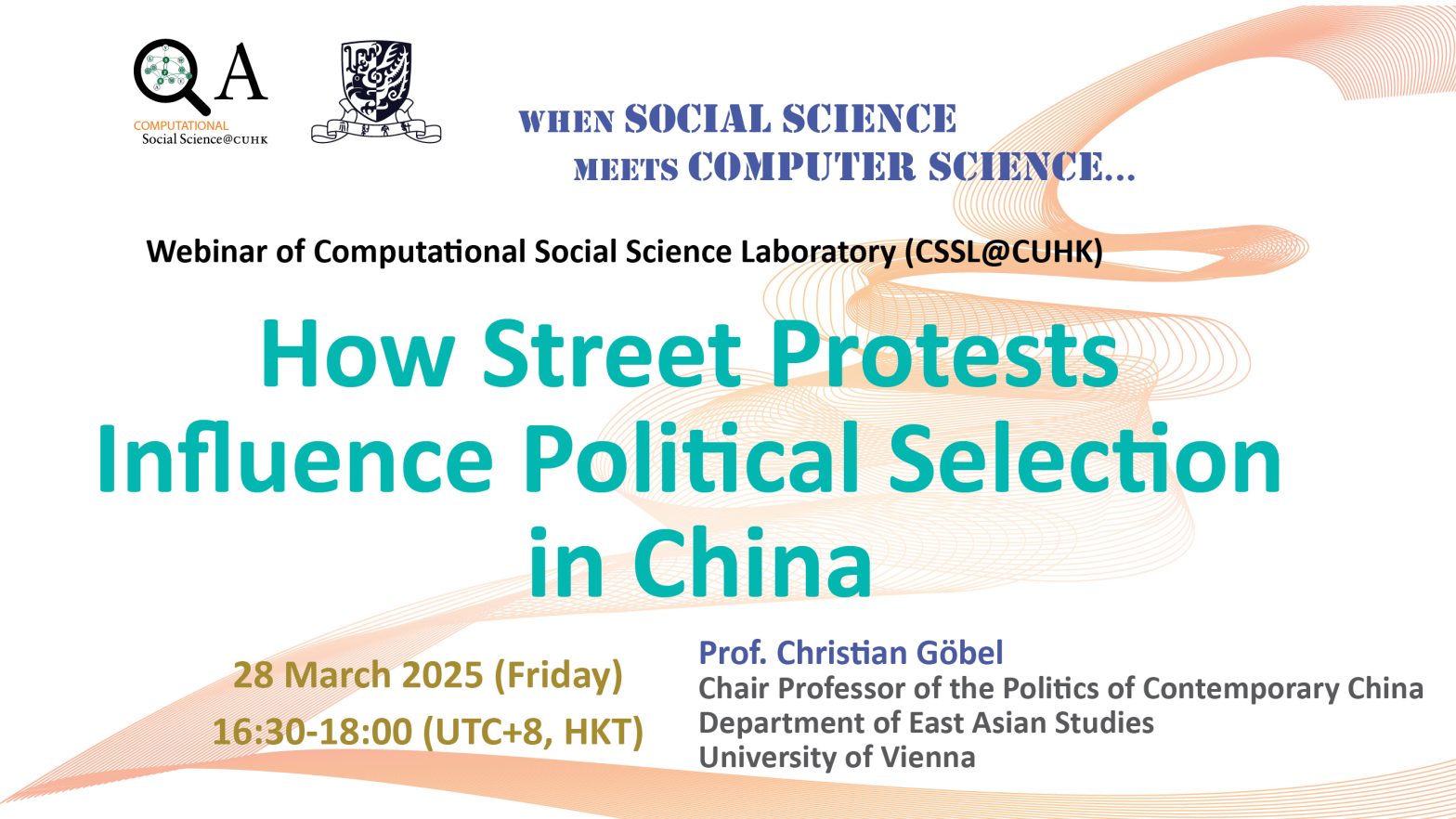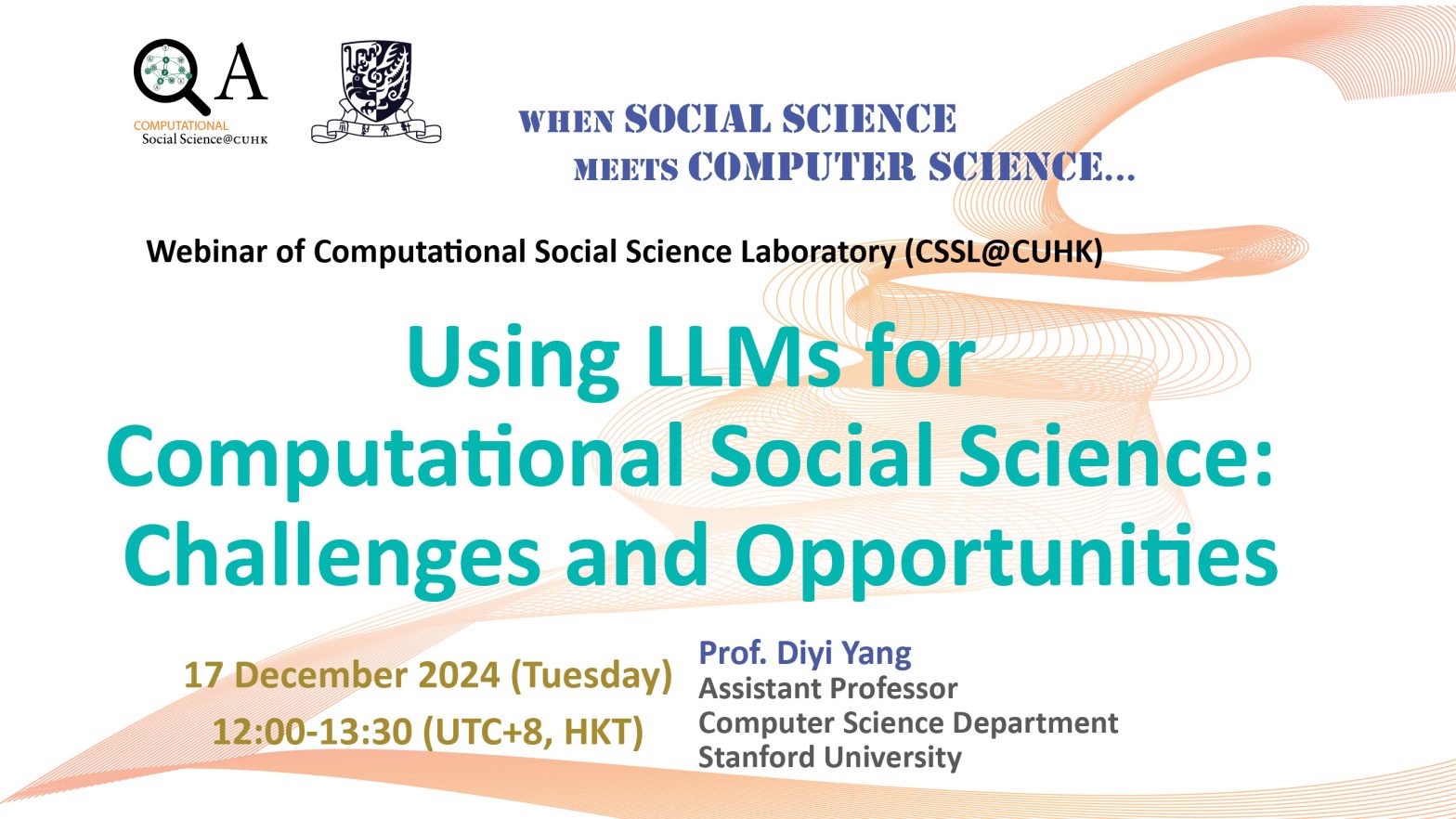Abstract: This talk probes the role of luck in the determination of success in the life course. We ask whether when people get lucky the trajectory of their life success increasingly diverges from that of their unlucky counterpart. We study this question theoretically using basic models of positive feedback. Empirically we look at the lives… Continue reading Luck and Success in Millions of Life Courses
Author: Editor
Large Language Models and the 5W1H: Strengths, Weaknesses, and Open Questions
Abstract: Large language models (LLMs) are increasingly employed in social science research as tools for analyzing text, generating insights, and assisting with theory development. Yet their contributions remain uneven, with strengths in some domains and significant limitations in others. This talk evaluates LLMs’ potential and constraints through the classic “5W1H” framework: What, Who, Whom, Where,… Continue reading Large Language Models and the 5W1H: Strengths, Weaknesses, and Open Questions
Comparing Modularity Scores Across Different Social Networks: Cautions, Illustrations, and Suggestions
Abstract: In the thriving field of network studies, there has been a recently emerging practice of comparing the optimal modularity scores across different social networks to evaluate the variation of network-module-related substantive concepts, such as the levels of consensus, polarization, or community boundary rigidity. Although the rationale for this practice is comprehensible, we caution that it suffers… Continue reading Comparing Modularity Scores Across Different Social Networks: Cautions, Illustrations, and Suggestions
Research Insights and Perspectives of Urban Digital Twins
Abstract: The talk will present recent research efforts on urban and geospatial modelling at the NUS Urban Analytics Lab, in particular focusing on urban digital twins. The Lab spearheads a holistic and intertwined research agenda that covers the entire geospatial process in the urban sphere: from advancing means to acquire data and assess its quality… Continue reading Research Insights and Perspectives of Urban Digital Twins
The Impact of Regulation on Open Source Development: Evidence from Gitee
Abstract: Open-source software transcends national boundaries, enabling collaboration among developers in universities, companies, and governments worldwide and contributes significantly to global economic activity. However, governments are increasingly exerting regulatory control over this global public good. In this paper, we examine the impact of one of these efforts – censorship on Gitee, a China-based code collaboration… Continue reading The Impact of Regulation on Open Source Development: Evidence from Gitee
How Street Protests Influence Political Selection in China
Abstract: How does recurring social unrest influence political selection within China’s authoritarian regime? While past research has highlighted the role of loyalty and economic performance in career advancement, the influence of social unrest remains largely unexplored. Drawing on two original datasets of 130,279 protest events and 55,069 career trajectory records of prefectural leaders from 2012… Continue reading How Street Protests Influence Political Selection in China
AI as Humans? Using LLMs to Synthesize Human Responses in Persuasive Contexts
Abstract: Generative AI and LLMs are not only enhancing the efficiency of communication research; they are fundamentally reshaping how scholars observe and understand the intricacies of human communication processes and effects. By automating tasks that once required extensive human efforts such as experimental design and data annotation, LLMs provide new ways to approach complex communication… Continue reading AI as Humans? Using LLMs to Synthesize Human Responses in Persuasive Contexts
The 3rd International Conference on Computational Social Science
( Only Chinese version is available ) 2025年 1月 17日 至 18日, 第三屆計算社會科學國際會議在香港中文大學沙田校區成功舉辦。本屆會議由清華大學社會科學學院與香港中文大學計算社會科學實驗室共同主辦,由清華大學計算社會科學與國家治理實驗室、清華大學數位政府與治理研究院與香港中文大學社會學系共同協辦。 清華大學社會科學學院副院長、計算社會科學與國家治理實驗室副主任、教授孟天廣在致辭中首先分享了清華大學在計算社會科學領域的發展歷程和研究進展,隨後介紹了全國範圍內計算社會科學研究共同體的形成,並強調了數位化、智慧化社會發展對計算社會科學人才培養和學科建設的迫切需求。他對香港中文大學以及全球各地前來參會的專家學者表示誠摯感謝,並提倡透過建構國際交流平台促進學術交流與合作,進一步推動計算社會科學的學科發展。 孟天廣教授致辭 香港中文大學社會科學院院長、偉倫新聞與傳播學教授馮應謙在致辭中強調了國際化視野和多學科交叉研究的重要性,回顧了香港中文大學計算社會科學實驗室在推動學科創新方面的探索與成果。他表示,期待加強香港與內地大學的交流合作,共同承接跨領域合作與國際合作的重要使命,推動學科發展與科研創新。香港中文大學社會學系主任、計算社會科學實驗室主任、教授譚康榮表示,本屆會議是一個良好的交流學習機會,加強了各校對於計算社會科學學科發展與實驗室建設的經驗分享,他期待本屆會議能促進更多研究成果,期待會議持續舉辦與發展。開幕式環節由香港中文大學新聞傳播學院副教授、計算社會科學實驗室副主任梁海主持。 馮應謙教授致辭 譚康榮教授致辭 主題演講環節,香港中文大學政務與政策學院院長、教授Pierre Landry,香港城市大學計算社會科學講座講授祝建華,清華大學社會科學學院社會學系教授羅家德,香港中文大學(深圳)校長講座教授、人文社科學院院長唐文方,北京大學全球風險政治分析實驗室主任、國際關係學院教授龐珣,南洋理工大學南洋公共管理學院院長、公共政策與全球事務系副教授王珏分別圍繞量化研究、基於大語言模型的計算社會科學研究、計算社會科學的發展與挑戰等方向分享了相關研究。 主題演講環節 會議同時設定了「計算政治學」「國際關係、民意與計算」「計算傳播學」「人工智慧與社會計算」「計算經濟學」「城市計算與治理」「計算社會學」「數位政府與治理」八個專題分享環節,清華大學政治系教授蘇櫓淞、政治系教授孟天廣、國際關係學系副教授漆海霞、經濟學研究所副教授李紅軍、社會學系副教授趙一璋、政治系副教授胡悅、政治系博士後於建鈞參會並分享了各自的研究進展與成果。 清華學者專題分享 本屆會議邀請了來自20餘所大學的40餘名學者深入探討計算社會科學的理論內涵、研究方法、範式變革、最新成果等議題,吸引了100餘名聽眾與會交流。本屆論壇致力於促進計算社會科學的國際交流與合作,透過跨國學者共同努力建立良好的學術交流平台,為人類社會數位化智慧轉型提供新的知識貢獻,進一步推動計算社會科學的學科建設與人才培養。 現場合照(部分師生) *The article was reproduced from the Tsinghua University “Data and Governance” WeChat official account: https://mp.weixin.qq.com/s/K8ZvwMZVJf_jkJAeou8HTw Related Posts AI as Humans? Using LLMs to Synthesize Human Responses in… Continue reading The 3rd International Conference on Computational Social Science
Explaining the Evolution of Gossip
Abstract: Gossip, the exchange of personal information about absent third parties, is ubiquitous in human societies. However, the evolution of gossip remains a puzzle. The current article proposes an evolutionary cycle of gossip and uses an agent-based evolutionary game-theoretic model to assess it. We argue that the evolution of gossip is the joint consequence of… Continue reading Explaining the Evolution of Gossip
Using LLMs for Computational Social Science: Challenges and Opportunities
Abstract: Large language models (LLMs) have created unprecedented opportunities for analyzing and generating language data on a massive scale, which has the potential to transform the field of social sciences since language data play a central role in all areas. In this talk, we present a road map for using LLMs as computational social science… Continue reading Using LLMs for Computational Social Science: Challenges and Opportunities


